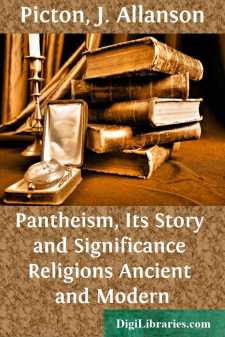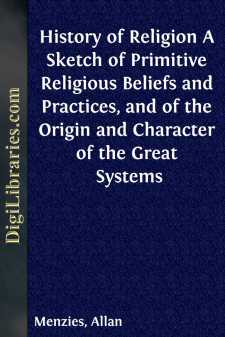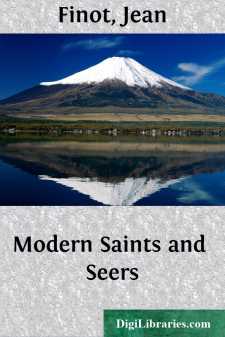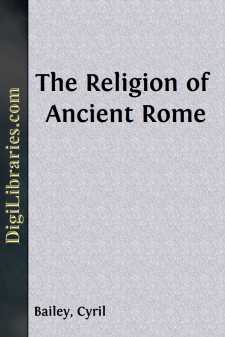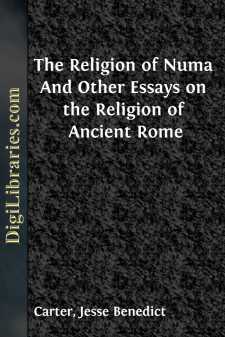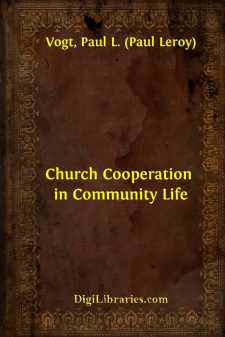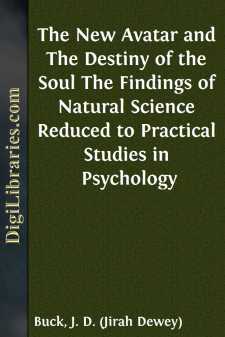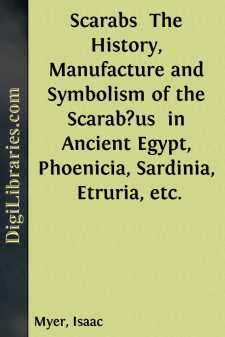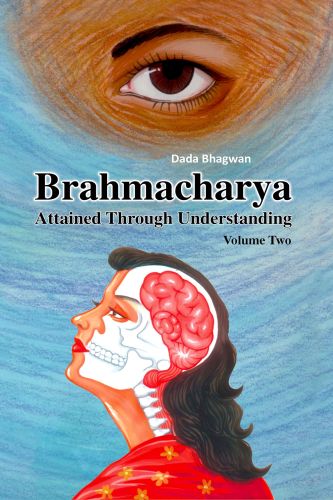Religion
- Agnosticism 2
- Antiquities & Archaeology 21
- Atheism 12
- Biblical Criticism & Interpretation 15
- Biblical Meditations 3
- Biblical Reference 1
- Biblical Studies 11
- Buddhism 8
- Christian Church 52
- Christian Education 5
- Christian Life 26
- Christianity 60
- Cults 2
- Devotional 6
- Eastern 2
- Education 4
- Eschatology 1
- Ethics 3
- General
- Gnosticism 1
- Hinduism 15
- History 28
- Holidays 10
- Inspirational 1
- Islam 8
- Judaism 3
- Leadership 1
- Meditations 3
- Monasticism 1
- Mysticism 11
- Philosophy 4
- Prayer 26
- Prayerbooks 5
- Religion & Science 12
- Sermons 54
- Spirituality 53
- Theism 2
- Theology 17
- Theosophy 15
General Books
Sort by:
CHAPTER I PRE-CHRISTIAN PANTHEISMIts Origins Doubtful and Unimportant. It has been the customary and perhaps inevitable method of writers on Pantheism to trace its main idea back to the dreams of Vedic poets, the musings of Egyptian priests, and the speculations of the Greeks. But though it is undeniable that the divine unity of all Being was an almost necessary issue of earliest human thought upon the...
more...
by:
Allan Menzies
INTRODUCTION The science to which this little volume is devoted is a comparatively new one. It is scarcely half a century since the attention of Western Europe began to fix itself seriously on the great religions of the East, and the study of these ancient systems aroused reflection on the great facts that the world possesses not one religion only, but several, nay, many religions, and that these...
more...
by:
Jean Finot
"Listen within yourselves, and gaze into the infinity of Space and Time. There resounds the song of the Stars, the voice of Numbers, the harmony of the Spheres."—HERMES TRISMEGISTUS. In these days the phenomenon of religion, which we believed to have receded into the background of human life, is reappearing among us, more vigorous than ever. The four years' desolation into which the...
more...
by:
Cyril Bailey
CHAPTER I INTRODUCTION—SOURCES AND SCOPE The conditions of our knowledge of the native religion of early Rome may perhaps be best illustrated by a parallel from Roman archæology. The visitor to the Roman Forum at the present day, if he wishes to reconstruct in imagination the Forum of the early Republic, must not merely 'think away' many strata of later buildings, but, we are told, must...
more...
INTRODUCTION. THE SIGNIFICANCE OF FRANZ CUMONT'S WORK. Franz Cumont, born January 3, 1868, and educated at Ghent, Bonn, Berlin, and Paris, resides in Brussels, and has been Professor in the University of Ghent since 1892. His monumental work, Textes et monuments figurés relatifs aux mystères de Mithra, published in 1896 and 1899 in two volumes, was followed in 1902 by the separate publication,...
more...
THE RELIGION OF NUMA Rome forms no exception to the general rule that nations, like individuals, grow by contact with the outside world. In the middle of the five centuries of her republic came the Punic wars and the intimate association with Greece which made the last half of her history as a republic so different from the first half; and in the kingdom, which preceded the republic, there was a...
more...
PREFACE Many books have been written during the past few years on the rural church. Some of these have given excellent concrete illustrations of methods that are proving successful in solving local problems. Others have discussed the general rural church situation. The rural life movement, however, has been so rapid that it is believed that a brief restatement of the place of the church in the rural...
more...
FOREWORD The reader who is willing to give the following pages a careful reading, and a courteous hearing, is entitled to know the basis of study, observation or experience from which the suggestions, inferences and conclusions proceed, in order that he may fairly estimate their value. At the age of seventy-two, my egotism is at least softened by the discovery of the many things I do not know; and my...
more...
by:
Isaac Myer
INTRODUCTION. The following work is taken in part, from an address delivered by me before, The American Numismatic and Archæological Society, at its Hall in the City of New York, on March 30th, 1893. Since that time I have been led into a train of thought, having as its basis a more philosophical treatment of the meaning of the scarabæus as a symbol, in the religious metaphysic conception of it by...
more...
by:
DadaBhagwan
Each and every human being has the capacity to identify his Soul and attain salvation. However, one severe obstacle on this path could be sexual attraction/ infatuation. None other than a Gnani Purush (the enlightened one) can help us understand the science behind sexual attraction and help us get rid of it. In the book, Dadashri, the Gnani Purush has discussed the importance of celibacy in the path of...
more...


